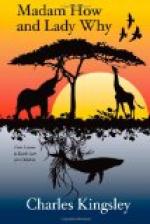Sometimes, again, especially in Denmark, these savages have left behind upon the shore mounds of dirt, which are called there “kjokken-moddings”—“kitchen-middens” as they would say in Scotland, “kitchen-dirtheaps” as we should say here down South—and a very good name for them that is; for they are made up of the shells of oysters, cockles, mussels, and periwinkles, and other shore-shells besides, on which those poor creatures fed; and mingled with them are broken bones of beasts, and fishes, and birds, and flint knives, and axes, and sling stones; and here and there hearths, on which they have cooked their meals in some rough way. And that is nearly all we know about them; but this we know from the size of certain of the shells, and from other reasons which you would not understand, that these mounds were made an enormous time ago, when the water of the Baltic Sea was far more salt than it is now.
But what has all this to do with my fairy tale? This:—
Suppose that these people, after all, had been fairies?
I am in earnest. Of course, I do not mean that these folk could make themselves invisible, or that they had any supernatural powers—any more, at least, than you and I have—or that they were anything but savages; but this I do think, that out of old stories of these savages grew up the stories of fairies, elves, and trolls, and scratlings, and cluricaunes, and ogres, of which you have read so many.
When stronger and bolder people, like the Irish, and the Highlanders of Scotland, and the Gauls of France, came northward with their bronze and iron weapons; and still more, when our own forefathers, the Germans and the Norsemen, came, these poor little savages with their flint arrows and axes, were no match for them, and had to run away northward, or to be all killed out; for people were fierce and cruel in those old times, and looked on every one of a different race from themselves as a natural enemy. They had not learnt—alas! too many have not learned it yet—that all men are brothers for the sake of Jesus Christ our Lord. So these poor savages were driven out, till none were left, save the little Lapps up in the north of Norway, where they live to this day.




